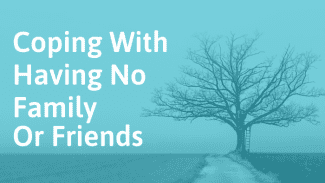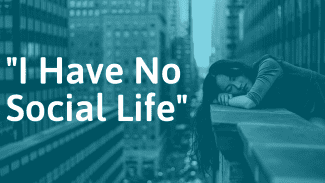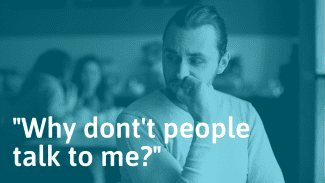“I feel like no one understands me. There isn’t anyone I can talk to about my feelings or what I’m going through. Whenever I try, I feel like I can’t express things in the right way. The more I try, the more I feel misunderstood and criticized.”
Being alone is tough, but it often feels worse to be around people and feel misunderstood. Feeling like people don’t understand us can make us feel even more lonely than we would if we were home alone.
It’s as if the people are acting like a mirror and showing us our worst nightmares. Self-critical thoughts will run through our minds.
No one gets me. I’m defective — too weird for this world. I’ll always be alone.
When we feel like we are different from others, we naturally become more guarded. We’ll share less information or speak defensively. That makes it more likely that someone will misunderstand us. So the cycle repeats.
The importance of feeling understood
We’ve known that feelings of belonging, love, and acceptance are basic human needs from at least 1943 when Maslow came out with his theory on the hierarchy of needs.
Yet, we can’t feel that we belong if we think that we aren’t understood.
Feeling understood by others helps us understand ourselves. We feel more satisfied in relationships where we feel we can share openly. Studies on romantic relationships show that open communication[1] and partner acceptance[2] have major influences on partner satisfaction. When we feel understood, we experience less loneliness and depression.
You might like to learn how to improve communication in a relationship.
Why does no one understand me?
You may need to work on improving your communication so that your intentions are clearer to others. Feeling misunderstood may be a side effect of depression. Or you may not have found like-minded people who understand you.
Sections
Why it feels like no one understands you
1. Bullying
When we are bullied or grow up in an unsupportive environment, we may adopt a subconscious expectation for future interactions. When we speak to new people, we’re not sure if we can trust them. We may suspect their intentions or distrust their compliments. We may mistake friendly teasing for mean comments.
In some cases, we may assume that someone misunderstands us. We either read negative intentions into their words or assume that they take our words as negative.
Or we believe deep down that there is something wrong with us. Children tend to blame themselves when caretakers or peers mistreat them. Secretly, we think that we’re defective and are afraid that others will find out if they get to know us.
This type of thinking can lead to a lot of misunderstandings. Fortutently, it’s not set in stone. We can work to change our core beliefs about ourselves and others.
2. Expecting one person to meet all of your needs
You may have been lucky enough to have found a friend who shares your interest in philosophy or true crime podcasts.
Finally! Someone who gets me, you think.
Then, you may realize that this person doesn’t share your sense of humor. That familiar dread starts to creep up again: I’ll never meet someone who really gets me.
But wait. This person did understand you – several parts of you, but not all of them.
The truth is, it’s quite common to have several relationships in our lives, each with a different purpose.
You may have one friend who loves to go out and try new restaurants with you. Another friend may be great for in-depth talks, but not so much for fun nights out or hiking trips.
Releasing our expectation that one person will be able to understand all the different parts of us can release us from disappointment.
3. Expecting someone to understand you fully
This Saturday Morning Breakfast Cereal cartoon makes a joke out of a complicated reality: we can never fully know another person.
That doesn’t mean we can’t know another person very well.
All of us have more thoughts running through our minds that we could speak out loud.
Our minds are quicker than our speech. And we may decide that not every thought is worth sharing.
Sometimes we expect someone to just understand what we mean because they know us. We expect them to anticipate our needs, show care in the same way that we do, or understand immediately what they did that upset us.
Like most things in life, the truth is more complicated than that. If we understand that no one can be a mind reader or know us on every level, we will be better at dealing with feeling misunderstood.
4. Not communicating effectively
Sometimes, we think we are very clear with what we’re saying.
“I’m so swamped with work, homework, and everything at home. I wish I had some help!”
To you, this may sound like an obvious example of asking for help. You may feel disappointed, frustrated, or even angry when your friend won’t offer to help you or suggest moving your meeting to a later time when you’re less busy.
But your friend may not have picked up on your call for help at all. They may have thought you just need to vent.
Sometimes it’s the other way around. Someone may think that you need help, so they will make suggestions for things you can do to improve your situation. But you may end up feeling misunderstood and judged.
Most of us aren’t used to being direct with our feelings and needs, but it’s a skill we can learn.
5. Giving up too soon
“No one understands me” can be a self-defeating attitude. It’s as if you’re telling yourself, “It’s not going to work. Don’t bother,” at the first hint of trouble.
The truth is, people misunderstand each other all the time. The difference between someone who thinks “no one understands me” and someone who doesn’t is their belief system.
For example, if you hold a belief that there is something wrong with you, you may feel shame or panic when you feel misunderstood by others. As a result, you may shut down and think something like, “there’s no point. People always misunderstand me.”
Let’s take someone who believes, “I am just as worthy as others. I deserve to be heard, and so do they.” They may still feel frustration when they feel unheard or misunderstood by others. Yet because they won’t experience such a major emotional reaction, they are more likely to choose to deal with it by trying to calmly experience their position differently.
6. Depression
People may indeed have difficulty understanding what you’re going through if they’ve never experienced depression. Some people don’t know how to respond and may say unhelpful things like, “Happiness is a choice” or “What doesn’t kill you makes you stronger.”
These reactions make us feel even more alone.
But often, when we have depression, we feel misunderstood and alone even before we’ve said anything. We assume no one will understand us, or we think we shouldn’t “burden” anyone with our problems.
These feelings and assumptions often lead to withdrawal, a common symptom of depression. The withdrawal strengthens the “no one understands me” belief.
7. Fear of rejection
People with rejection sensitivity are on the lookout for any sign of rejection and may misinterpret what other people say or do. A specific tone or look might make someone with depression feel judged, misunderstood, or rejected and send them into a shame spiral.
Rejection sensitivity is closely linked to depression[3] and Borderline Personality Disorder,[4] as well as other mental and emotional disorders such as ADHD. If you have social anxiety, you likely show hypervigilance in social situations, which you might interpret as more threatening.[5]
You don’t need a diagnosis to have rejection sensitivity. The truth is some people are more sensitive to rejection than others.
If you have difficulty overcoming your fear of being judged, read our article How To Overcome Your Fear of Being Judged. Do you feel like your depression and low self-worth make you feel misunderstood? Perhaps our article “I hate my personality” could help you.
What to do when it feels like no one understands you
1. Work on understanding yourself
Sometimes we expect people to understand us when we don’t even understand ourselves. For example, we may expect support, but we don’t know exactly what type of support we’re looking for.
Learning to understand your values, beliefs, and behaviors better can help you become clearer to others.
Several methods can help you understand yourself better. There are many journal prompts you can use to increase your self-awareness. For example, how did your parent figures respond to stress? How do you respond to stress? Find more journaling prompts ideas here.
A meditation practice can also help you become more aware of your thoughts and reactions. There are many free resources to get started with meditation, like the apps Calm, Headspace, and Waking Up With Sam Harris. You can also find many Youtube videos that offer meditation tips or guided meditations.
Talking to a mental health professional can also increase your mental health awareness. Therapists may use modalities like Acceptance-Commitment Therapy to help you identify your values in addition to your thought processes.
We recommend BetterHelp for online therapy, since they offer unlimited messaging and a weekly session, and are cheaper than going to a therapist's office.
Their plans start at $64 per week. If you use this link, you get 20% off your first month at BetterHelp + a $50 coupon valid for any SocialSelf course: Click here to learn more about BetterHelp.
(To receive your $50 SocialSelf coupon, sign up with our link. Then, email BetterHelp’s order confirmation to us to receive your personal code. You can use this code for any of our courses.)
2. Ask someone you trust how you are perceived
Sometimes our idea of how we’re perceived doesn’t match reality. If you have people you feel comfortable with, tell them you’re struggling with feeling misunderstood, and ask them how they perceive you and how they think others perceive you.
Hearing how others see you can help you understand what you can work on to be and feel more understood by others.
3. Find like-minded people to talk to
Sometimes we don’t have much in common with our family, classmates, or colleagues. Perhaps your family is scientific and data-driven while you’re more artistic, or the other way around. Or maybe you have niche interests that people around you don’t quite get.
Looking to connect with people who share your hobbies, interests, or worldview can help you feel more confident and understood. Joining different activities such as discussion groups, game nights, or meetups based on hobbies and interests can help you meet people you get along with better.
You may find that your family and friends don’t understand the mental health challenges you go through, like anxiety or depression. In that case, joining a support group may be beneficial. There are many peer-led meetings of people going through similar challenges, like Livewell and Adult Children of Dysfunctional Families.
You can also meet people on Reddit or other online communities.
Read more tips on finding like-minded people.
4. Learn to understand and communicate your needs
Try to be clear about what your needs are and learn to state them clearly. Learn to pay attention to subtle clues from your body when you are feeling uncomfortable. For example, you might notice that your shoulders are tensing when you are listening to a friend venting for a long time. This can clue you in to your discomfort, and share your discomfort before it spills over and appears in a sarcastic comment or passive-expressive response.
If you want to vent without getting any advice, you can say that. If a friend shares something with you and you’re not sure if they want advice or not, you can ask, “Are you just sharing, or are you open to advice?”
Get into the habit of asking yourself what you need and expressing it to the people around you. Try to focus on your feelings and needs instead of other people’s actions and avoid terms like “always” and “never.”
For example:
- Instead of saying, “You never think about me,” you could say, “When you told me you watched the movie we discussed with someone else, I felt disappointed.”
- Instead of saying, “You don’t respect my space,” you could say, “I find it difficult when people use my belongings without me knowing. I need you to ask me before you enter my room.”
For more tips about communicating your needs with others effectively, read about non-violent communication.
5. Accept that people will misunderstand you
If you make peace with the fact that sometimes people will misunderstand you, you will take misunderstandings in stride.
Instead of getting stressed out or wanting to retreat, you can instead say, “Actually, what I meant was…”
If someone still doesn’t understand where you’re coming from, that’s all right. Some people may be committed to misunderstanding, or we just can’t see eye-to-eye on a particular topic. Sometimes we just need to “agree to disagree.”
6. Match your body language to your words
One common reason that people feel misunderstood is that there is a gap between their intention and execution.
You may have made a joke, but someone took it personally. Understandably, you might feel frustrated. But we can look at every misunderstanding as an opportunity to understand ourselves and others better. In some cases, we may find that our actions and words don’t really match.
If you were making a joke, a harsh tone or closed-off body language might have made it appear sarcastic instead of playful. Making sure to have a light smile will help people understand when you’re making a joke.
Similarly, appearing confident can help people understand that you’re serious when you say “No.”
Read our article on how to look more friendly if you’re having issues with this. For a more in-depth look at body language, read our reviews on some of the best body language books.
7. Practice being vulnerable
Brene Brown gave a viral TED talk on vulnerability. She claims that when we are vulnerable and share our shame with an understanding person, our shame loses its power.
If you’re assuming that no one will understand what you’re going through, feelings of shame may increase inside you. Sometimes, people will surprise you — but you have to give them a chance.
She does warn against sharing shame with the wrong people, though, saying: “If we share our shame story with the wrong person, they can easily become one more piece of flying debris in an already dangerous storm.”
Don’t choose someone who you know is critical and judgemental to share your vulnerabilities. Instead, try someone you know is kind and compassionate or a dedicated space like a therapy session or support group.
8. Get help for underlying issues
Anxiety, depression, borderline personality disorder, and other disorders can provide insight into why we behave a certain way.
It may take time to find a therapist or modality that works for you, but don’t give up. Our psychological understanding is increasing rapidly, and there are many effective treatments out there today. If you’re having difficulty finding therapists in your area, there are online therapists who practice modalities such as Dialectical Behavioral Therapy, Internal Family Systems, and other modalities you may find helpful.
We recommend BetterHelp for online therapy, since they offer unlimited messaging and a weekly session, and are cheaper than going to a therapist's office.
Their plans start at $64 per week. If you use this link, you get 20% off your first month at BetterHelp + a $50 coupon valid for any SocialSelf course: Click here to learn more about BetterHelp.
(To receive your $50 SocialSelf coupon, sign up with our link. Then, email BetterHelp’s order confirmation to us to receive your personal code. You can use this code for any of our courses.)
You can supplement therapy by reading self-help books, watching YouTube videos, and listening to podcasts about mental health.






… feel misunderstood ….? My arse! What other mealy-mouthed weasel words have you got?
ARE misunderstood is the correct English expression.
Beyond simple or trivial universal experiences or the cliched, I don’t think anyone is capable of understanding what they have not experienced. Therapists included. Even if they wanted to. And they invariably don’t. Why share anything beyond the banal when you’re never understood?
why do you seem mad about it? does feel or are really matter that much?
Thank you very much for this words it really enter my mind